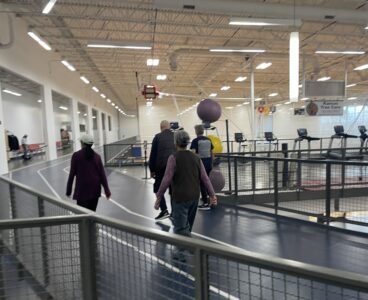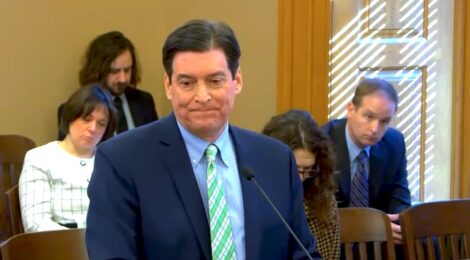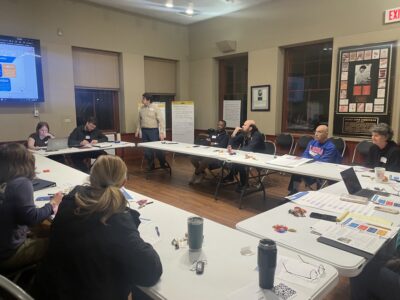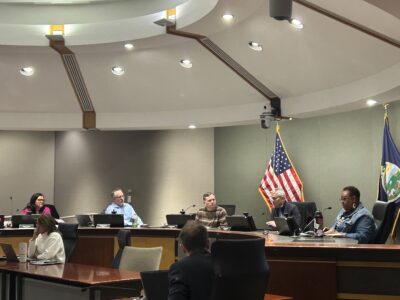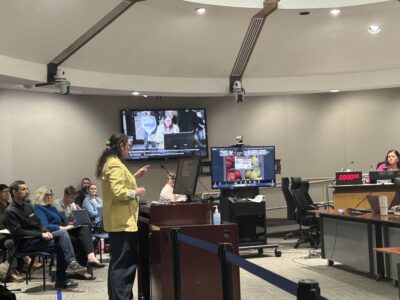No consensus yet on Lawrence City Commission about new downtown bus hub location

photo by: City of Lawrence
Riders board a city bus in Lawrence in this undated photo submitted by the City Lawrence.
Some Lawrence city commissioners seem close to making up their minds on where the city’s new downtown bus hub should go — but, with a month to go before the vote, they’re not all in favor of the same site.
At its meeting on Tuesday, the commission gave more feedback to Lawrence Transit about where the bus hub should be located. Last month, the commission narrowed the options down to two sites: city parking lot No. 9 on the west side of the 900 block of Vermont Street, and the current bus transfer area and city parking lot No. 14 in the 700 block of Vermont Street.
Adam Weigel, director of transit and parking, presented some basic concepts for both sites on Tuesday — with the caveat that the designs right now “can’t be super in-depth,” because the process won’t just involve the city, but also agencies like the Kansas Department of Transportation.
Weigel did say that at both sites, two of the bus bays would still pick up and drop off passengers along the street, while four would be inside of the current parking lot space. That decision was in part because otherwise those lots might not have enough room for the buses to turn, Weigel said.
Along with the bus bays, the project would feature restrooms, a building for security and canopies and benches to provide more comfort for people waiting for the bus — all things the current transfer location lacks. The station would be staffed by the city from 6 a.m. to 8 p.m. Monday through Saturday, according to the Transit Department.
One difference Weigel mentioned was that the design at lot No. 14 would also need a new crosswalk to be built for safer pedestrian access.
In Tuesday’s discussion, the commissioners who did voice a preference were split between the 700 block and the 900 block. Commissioner Mike Dever said that the 700 block might be better since it was closer to the Lawrence Public Library, and Mayor Bart Littlejohn also said he was leaning toward that option considering all the factors. Commissioner Amber Sellers, on the other hand, expressed a preference for the site in the 900 block, saying it seemed “more seamless” than the other option, which might need additional curb cuts to allow buses to come through and other traffic changes.
The city’s transit office has been working out of the current downtown location for about a decade, and the Downtown Transit Station Steering Committee has been working since January to find the suitable permanent site for the bus station downtown, which will serve the five routes that come in and out of downtown.
Commissioners still have not taken a vote to approve a final site. That is scheduled to happen during the Dec. 17 meeting.
In other business, commissioners:
• Asked city staff to explore the creation of ordinances that can impose a demolition moratorium for certain structures.
During discussion of the new Land Development Code, which was approved by the commission last week, as the Journal-World reported, the Historic Resources Commission sent a letter to commissioners asking for a moratorium on the approval for demolition of structures that are 50 years old or older if they are located in an area where a historic survey is scheduled to be conducted.
Dennis Brown, a member of the Lawrence Preservation Alliance, told the commission the city is currently working on two historic surveys in University Place neighborhood and NAACP founders’ sites.
The group previously highlighted its concerns in a letter to commissioners about the potential effects the new code could have on some neighborhoods as the code looks to increase housing density in the city.
Commissioners Brad Finkeldei and Lisa Larsen both immediately expressed support for the idea of asking city staff to draft up those moratoriums. Those ordinances will eventually be brought back to the commission for consideration.
• Asked city staff to research the feasibility of a request from the Alvamar Neighborhood Association that would potentially rezone all golf courses as open space zoning districts.
A letter from the Alvamar Neighborhood Association sent to the commission noted that under the new land development code, the Alvamar golf course area would be rezoned as an R-2 district, while the Lawrence Country Club would be rezoned as R-1. Both of those are residential zoning categories.
Scott Robinson, the president of the ANA, said other courses in the city were zoned as open space districts, so changing the districts for those two golf courses would “create troubling inconsistencies.”
Robinson also presented a petition supporting the rezoning proposal that was signed by 350 other residents in the Alvamar neighborhood.
Commissioners were generally supportive of the possibility, with Dever saying the inconsistency about the golf courses “does not look good on paper.” However, the majority of commissioners said that the city needed to learn more information about how the rezoning would impact the courses and neighborhoods around them.
Along with directing staff to send letters to the property owners about the potential zoning change, the commissioners asked the city to get more research about the impacts and present its findings in three to four months — about how long Jeff Crick, the city’s Planning and Development Services director, estimated it would take to find that information.
Randy Larkin, the deputy city attorney, said any change to this kind of zoning would have to go through the Planning Commission first before the City Commission would hear it.


